Business Ethics: Ethical Theories and Corporate Governance
VerifiedAdded on 2021/04/17
|16
|4103
|68
Report
AI Summary
This report provides a comprehensive analysis of business ethics, focusing on ethical theories, corporate governance, and stakeholder management. It begins by defining ethics and its importance in business, followed by an exploration of normative ethical theories, specifically consequentialism (utilitarianism) and non-consequentialism (deontological ethics). The report then examines corporate governance, outlining its principles and significance, using Tesco as a case study to illustrate the application of these principles. It delves into Tesco's corporate governance practices, including its board structure and committee functions, while also acknowledging past governance challenges. Finally, the report discusses stakeholders and their importance in ethical business practices. The report provides a detailed exploration of these key concepts in business ethics, making it a useful resource for students studying this field.

qwertyuiopasdfghjklzxcvbnmqwertyui
opasdfghjklzxcvbnmqwertyuiopasdfgh
jklzxcvbnmqwertyuiopasdfghjklzxcvb
nmqwertyuiopasdfghjklzxcvbnmqwer
tyuiopasdfghjklzxcvbnmqwertyuiopas
dfghjklzxcvbnmqwertyuiopasdfghjklzx
cvbnmqwertyuiopasdfghjklzxcvbnmq
wertyuiopasdfghjklzxcvbnmqwertyuio
pasdfghjklzxcvbnmqwertyuiopasdfghj
Business Ethics Assignment (Level 5)
Ethical Consultancy Report
14-Mar-18
(Student Details: )
opasdfghjklzxcvbnmqwertyuiopasdfgh
jklzxcvbnmqwertyuiopasdfghjklzxcvb
nmqwertyuiopasdfghjklzxcvbnmqwer
tyuiopasdfghjklzxcvbnmqwertyuiopas
dfghjklzxcvbnmqwertyuiopasdfghjklzx
cvbnmqwertyuiopasdfghjklzxcvbnmq
wertyuiopasdfghjklzxcvbnmqwertyuio
pasdfghjklzxcvbnmqwertyuiopasdfghj
Business Ethics Assignment (Level 5)
Ethical Consultancy Report
14-Mar-18
(Student Details: )
Paraphrase This Document
Need a fresh take? Get an instant paraphrase of this document with our AI Paraphraser
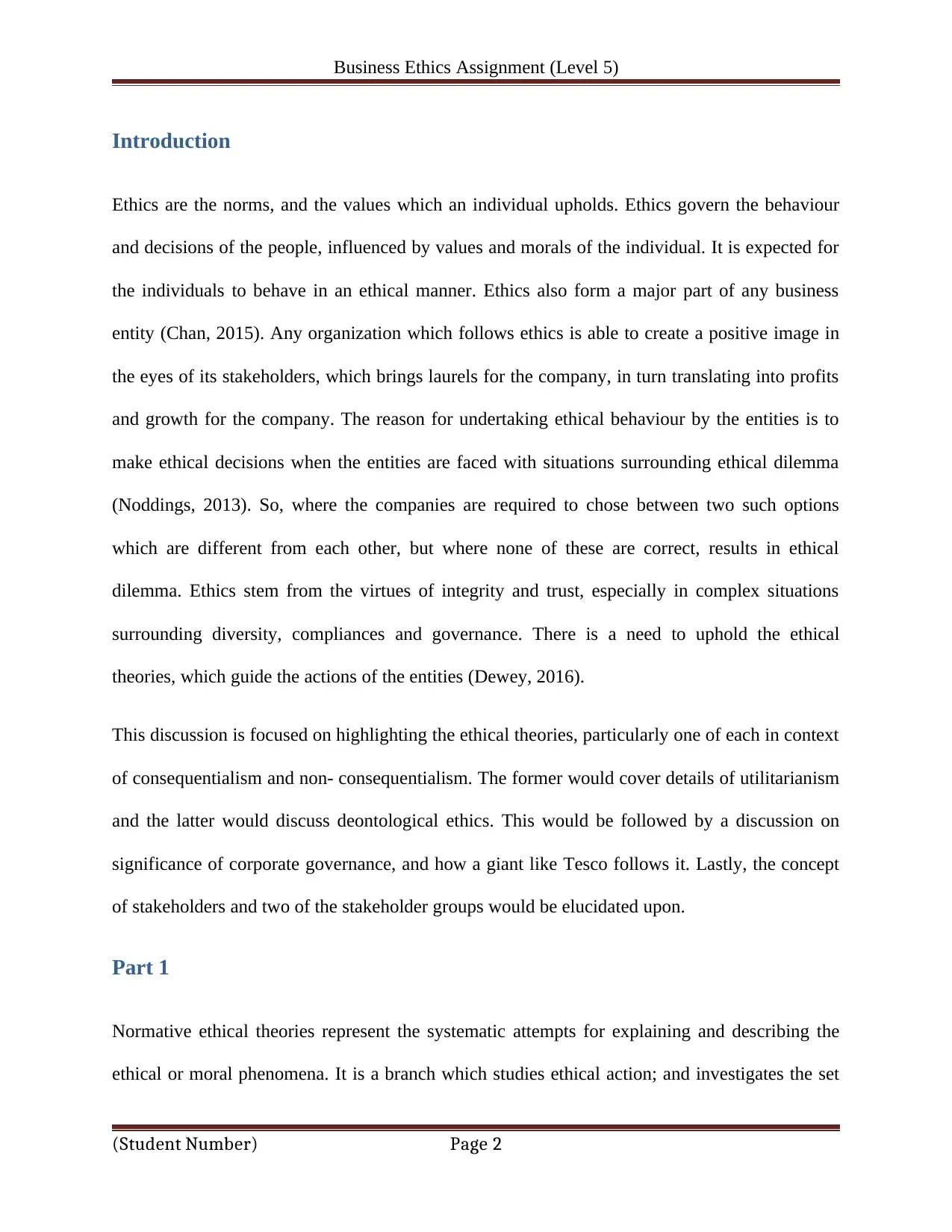
Business Ethics Assignment (Level 5)
Introduction
Ethics are the norms, and the values which an individual upholds. Ethics govern the behaviour
and decisions of the people, influenced by values and morals of the individual. It is expected for
the individuals to behave in an ethical manner. Ethics also form a major part of any business
entity (Chan, 2015). Any organization which follows ethics is able to create a positive image in
the eyes of its stakeholders, which brings laurels for the company, in turn translating into profits
and growth for the company. The reason for undertaking ethical behaviour by the entities is to
make ethical decisions when the entities are faced with situations surrounding ethical dilemma
(Noddings, 2013). So, where the companies are required to chose between two such options
which are different from each other, but where none of these are correct, results in ethical
dilemma. Ethics stem from the virtues of integrity and trust, especially in complex situations
surrounding diversity, compliances and governance. There is a need to uphold the ethical
theories, which guide the actions of the entities (Dewey, 2016).
This discussion is focused on highlighting the ethical theories, particularly one of each in context
of consequentialism and non- consequentialism. The former would cover details of utilitarianism
and the latter would discuss deontological ethics. This would be followed by a discussion on
significance of corporate governance, and how a giant like Tesco follows it. Lastly, the concept
of stakeholders and two of the stakeholder groups would be elucidated upon.
Part 1
Normative ethical theories represent the systematic attempts for explaining and describing the
ethical or moral phenomena. It is a branch which studies ethical action; and investigates the set
(Student Number) Page 2
Introduction
Ethics are the norms, and the values which an individual upholds. Ethics govern the behaviour
and decisions of the people, influenced by values and morals of the individual. It is expected for
the individuals to behave in an ethical manner. Ethics also form a major part of any business
entity (Chan, 2015). Any organization which follows ethics is able to create a positive image in
the eyes of its stakeholders, which brings laurels for the company, in turn translating into profits
and growth for the company. The reason for undertaking ethical behaviour by the entities is to
make ethical decisions when the entities are faced with situations surrounding ethical dilemma
(Noddings, 2013). So, where the companies are required to chose between two such options
which are different from each other, but where none of these are correct, results in ethical
dilemma. Ethics stem from the virtues of integrity and trust, especially in complex situations
surrounding diversity, compliances and governance. There is a need to uphold the ethical
theories, which guide the actions of the entities (Dewey, 2016).
This discussion is focused on highlighting the ethical theories, particularly one of each in context
of consequentialism and non- consequentialism. The former would cover details of utilitarianism
and the latter would discuss deontological ethics. This would be followed by a discussion on
significance of corporate governance, and how a giant like Tesco follows it. Lastly, the concept
of stakeholders and two of the stakeholder groups would be elucidated upon.
Part 1
Normative ethical theories represent the systematic attempts for explaining and describing the
ethical or moral phenomena. It is a branch which studies ethical action; and investigates the set
(Student Number) Page 2

Business Ethics Assignment (Level 5)
of questions which are raised when one considers the manner in which they act, in terms of
moral values. The normative ethical theories make it possible to isolate the tripartite structure
which is formed of moral standard, general moral principles, and the specific moral judgments
and principles. There are disagreements on the matter which give the disposition, action or rule,
its exact ethical force (Shaw, 2013). The applicability of normative ethical theories helps in
deciding the morality of the action, in terms of it being ethical or not. It also acts as guidance on
how to proceed on any matter in an ethical manner. There are certain normative theories which
focus on the end results and are thus referred to as the consequentialism theories, for instance
egoism and utilitarianism. On the other hand, there are other normative theories which focus on
the course of action adopted to undertake any task and are thus referred to as non-
consequentialism theories, for instance the deontological ethics or Kantism, or that given by
Locke or Rawls.
The consequentialism theories look at the end result, which is attained from being indulged in
any action. So, the focus is not on the course of action which is adopted by the parties for getting
on a decision; and is instead focused on the impact of such decision of people for holding the
undertaken action as unethical or ethical (Ferrell, Fraedrich and Ferrell, 2016). A leading
consequentialism theory is utilitarianism, which is often used in cases of ethical dilemma.
Through the use of utilitarianism theory, an action can be decided as being ethical or unethical,
on the basis of results of such act. The action would be considered as ethical when it results in
the utility of such action being maximized; and a converse situation would result in the action
being deemed as unethical (Bykvist, 2010).
This theory is considered as a sum of all pleasures which are attained from being indulged in any
act, particularly where the sufferings are eliminated upon undertaking such action. Hence, this
(Student Number) Page 3
of questions which are raised when one considers the manner in which they act, in terms of
moral values. The normative ethical theories make it possible to isolate the tripartite structure
which is formed of moral standard, general moral principles, and the specific moral judgments
and principles. There are disagreements on the matter which give the disposition, action or rule,
its exact ethical force (Shaw, 2013). The applicability of normative ethical theories helps in
deciding the morality of the action, in terms of it being ethical or not. It also acts as guidance on
how to proceed on any matter in an ethical manner. There are certain normative theories which
focus on the end results and are thus referred to as the consequentialism theories, for instance
egoism and utilitarianism. On the other hand, there are other normative theories which focus on
the course of action adopted to undertake any task and are thus referred to as non-
consequentialism theories, for instance the deontological ethics or Kantism, or that given by
Locke or Rawls.
The consequentialism theories look at the end result, which is attained from being indulged in
any action. So, the focus is not on the course of action which is adopted by the parties for getting
on a decision; and is instead focused on the impact of such decision of people for holding the
undertaken action as unethical or ethical (Ferrell, Fraedrich and Ferrell, 2016). A leading
consequentialism theory is utilitarianism, which is often used in cases of ethical dilemma.
Through the use of utilitarianism theory, an action can be decided as being ethical or unethical,
on the basis of results of such act. The action would be considered as ethical when it results in
the utility of such action being maximized; and a converse situation would result in the action
being deemed as unethical (Bykvist, 2010).
This theory is considered as a sum of all pleasures which are attained from being indulged in any
act, particularly where the sufferings are eliminated upon undertaking such action. Hence, this
(Student Number) Page 3
⊘ This is a preview!⊘
Do you want full access?
Subscribe today to unlock all pages.

Trusted by 1+ million students worldwide
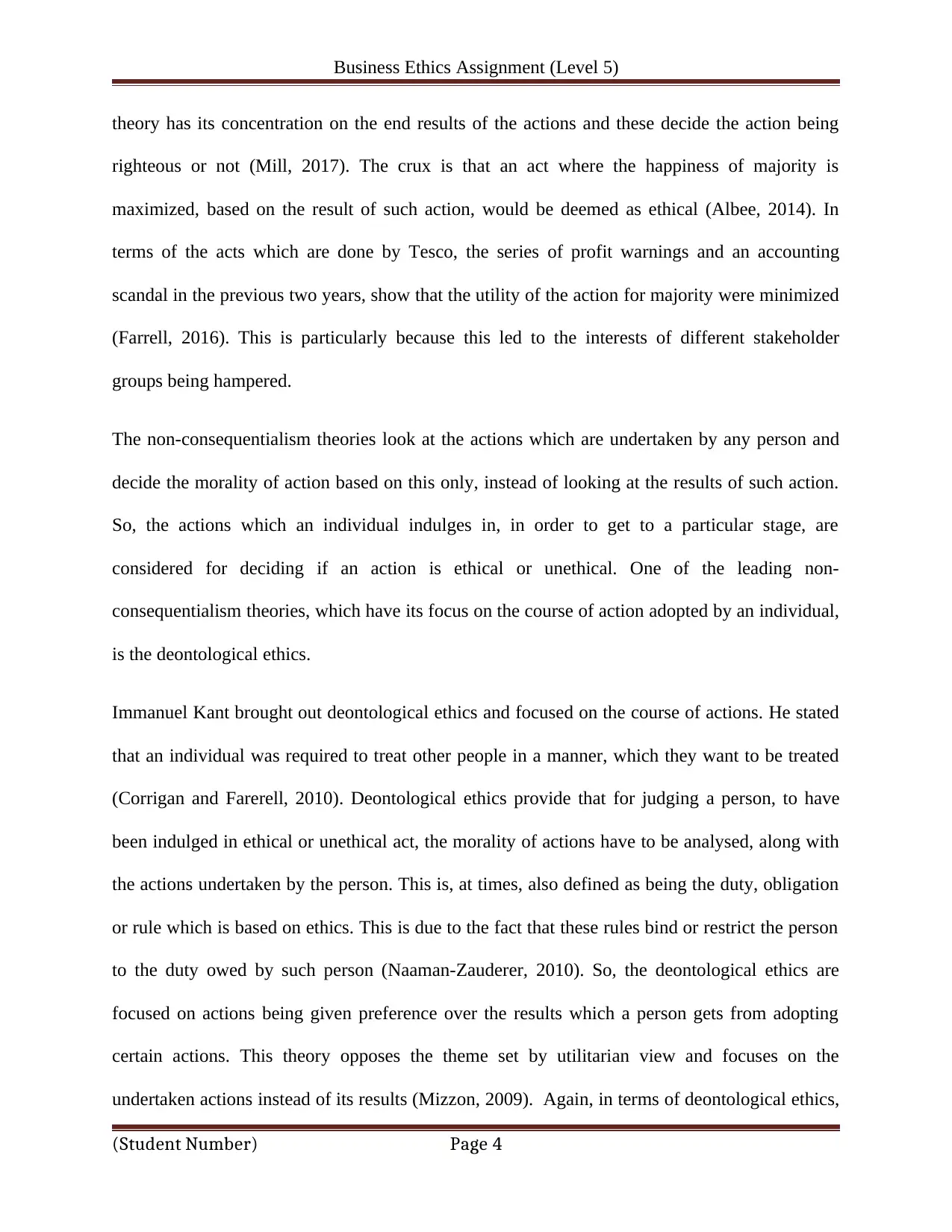
Business Ethics Assignment (Level 5)
theory has its concentration on the end results of the actions and these decide the action being
righteous or not (Mill, 2017). The crux is that an act where the happiness of majority is
maximized, based on the result of such action, would be deemed as ethical (Albee, 2014). In
terms of the acts which are done by Tesco, the series of profit warnings and an accounting
scandal in the previous two years, show that the utility of the action for majority were minimized
(Farrell, 2016). This is particularly because this led to the interests of different stakeholder
groups being hampered.
The non-consequentialism theories look at the actions which are undertaken by any person and
decide the morality of action based on this only, instead of looking at the results of such action.
So, the actions which an individual indulges in, in order to get to a particular stage, are
considered for deciding if an action is ethical or unethical. One of the leading non-
consequentialism theories, which have its focus on the course of action adopted by an individual,
is the deontological ethics.
Immanuel Kant brought out deontological ethics and focused on the course of actions. He stated
that an individual was required to treat other people in a manner, which they want to be treated
(Corrigan and Farerell, 2010). Deontological ethics provide that for judging a person, to have
been indulged in ethical or unethical act, the morality of actions have to be analysed, along with
the actions undertaken by the person. This is, at times, also defined as being the duty, obligation
or rule which is based on ethics. This is due to the fact that these rules bind or restrict the person
to the duty owed by such person (Naaman-Zauderer, 2010). So, the deontological ethics are
focused on actions being given preference over the results which a person gets from adopting
certain actions. This theory opposes the theme set by utilitarian view and focuses on the
undertaken actions instead of its results (Mizzon, 2009). Again, in terms of deontological ethics,
(Student Number) Page 4
theory has its concentration on the end results of the actions and these decide the action being
righteous or not (Mill, 2017). The crux is that an act where the happiness of majority is
maximized, based on the result of such action, would be deemed as ethical (Albee, 2014). In
terms of the acts which are done by Tesco, the series of profit warnings and an accounting
scandal in the previous two years, show that the utility of the action for majority were minimized
(Farrell, 2016). This is particularly because this led to the interests of different stakeholder
groups being hampered.
The non-consequentialism theories look at the actions which are undertaken by any person and
decide the morality of action based on this only, instead of looking at the results of such action.
So, the actions which an individual indulges in, in order to get to a particular stage, are
considered for deciding if an action is ethical or unethical. One of the leading non-
consequentialism theories, which have its focus on the course of action adopted by an individual,
is the deontological ethics.
Immanuel Kant brought out deontological ethics and focused on the course of actions. He stated
that an individual was required to treat other people in a manner, which they want to be treated
(Corrigan and Farerell, 2010). Deontological ethics provide that for judging a person, to have
been indulged in ethical or unethical act, the morality of actions have to be analysed, along with
the actions undertaken by the person. This is, at times, also defined as being the duty, obligation
or rule which is based on ethics. This is due to the fact that these rules bind or restrict the person
to the duty owed by such person (Naaman-Zauderer, 2010). So, the deontological ethics are
focused on actions being given preference over the results which a person gets from adopting
certain actions. This theory opposes the theme set by utilitarian view and focuses on the
undertaken actions instead of its results (Mizzon, 2009). Again, in terms of deontological ethics,
(Student Number) Page 4
Paraphrase This Document
Need a fresh take? Get an instant paraphrase of this document with our AI Paraphraser
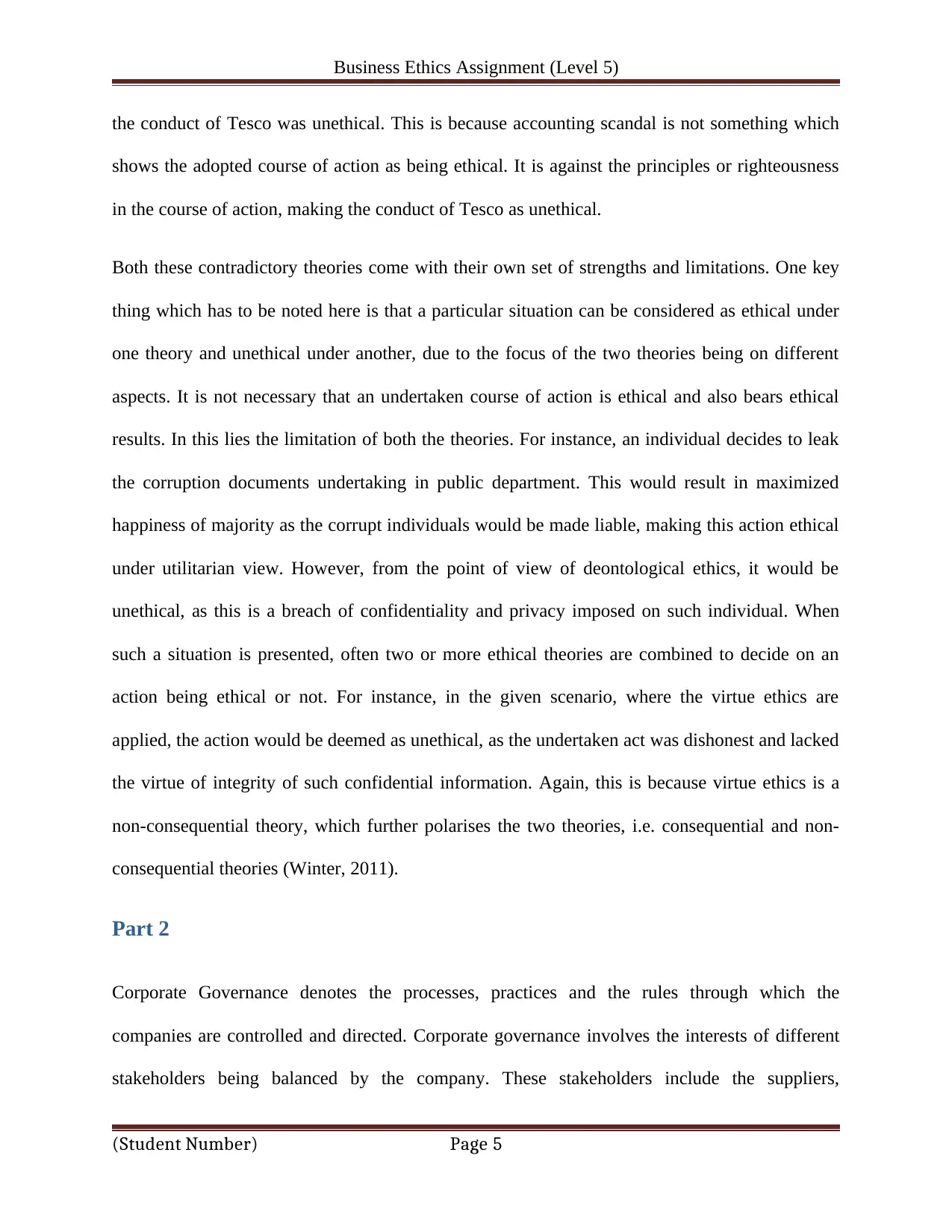
Business Ethics Assignment (Level 5)
the conduct of Tesco was unethical. This is because accounting scandal is not something which
shows the adopted course of action as being ethical. It is against the principles or righteousness
in the course of action, making the conduct of Tesco as unethical.
Both these contradictory theories come with their own set of strengths and limitations. One key
thing which has to be noted here is that a particular situation can be considered as ethical under
one theory and unethical under another, due to the focus of the two theories being on different
aspects. It is not necessary that an undertaken course of action is ethical and also bears ethical
results. In this lies the limitation of both the theories. For instance, an individual decides to leak
the corruption documents undertaking in public department. This would result in maximized
happiness of majority as the corrupt individuals would be made liable, making this action ethical
under utilitarian view. However, from the point of view of deontological ethics, it would be
unethical, as this is a breach of confidentiality and privacy imposed on such individual. When
such a situation is presented, often two or more ethical theories are combined to decide on an
action being ethical or not. For instance, in the given scenario, where the virtue ethics are
applied, the action would be deemed as unethical, as the undertaken act was dishonest and lacked
the virtue of integrity of such confidential information. Again, this is because virtue ethics is a
non-consequential theory, which further polarises the two theories, i.e. consequential and non-
consequential theories (Winter, 2011).
Part 2
Corporate Governance denotes the processes, practices and the rules through which the
companies are controlled and directed. Corporate governance involves the interests of different
stakeholders being balanced by the company. These stakeholders include the suppliers,
(Student Number) Page 5
the conduct of Tesco was unethical. This is because accounting scandal is not something which
shows the adopted course of action as being ethical. It is against the principles or righteousness
in the course of action, making the conduct of Tesco as unethical.
Both these contradictory theories come with their own set of strengths and limitations. One key
thing which has to be noted here is that a particular situation can be considered as ethical under
one theory and unethical under another, due to the focus of the two theories being on different
aspects. It is not necessary that an undertaken course of action is ethical and also bears ethical
results. In this lies the limitation of both the theories. For instance, an individual decides to leak
the corruption documents undertaking in public department. This would result in maximized
happiness of majority as the corrupt individuals would be made liable, making this action ethical
under utilitarian view. However, from the point of view of deontological ethics, it would be
unethical, as this is a breach of confidentiality and privacy imposed on such individual. When
such a situation is presented, often two or more ethical theories are combined to decide on an
action being ethical or not. For instance, in the given scenario, where the virtue ethics are
applied, the action would be deemed as unethical, as the undertaken act was dishonest and lacked
the virtue of integrity of such confidential information. Again, this is because virtue ethics is a
non-consequential theory, which further polarises the two theories, i.e. consequential and non-
consequential theories (Winter, 2011).
Part 2
Corporate Governance denotes the processes, practices and the rules through which the
companies are controlled and directed. Corporate governance involves the interests of different
stakeholders being balanced by the company. These stakeholders include the suppliers,
(Student Number) Page 5
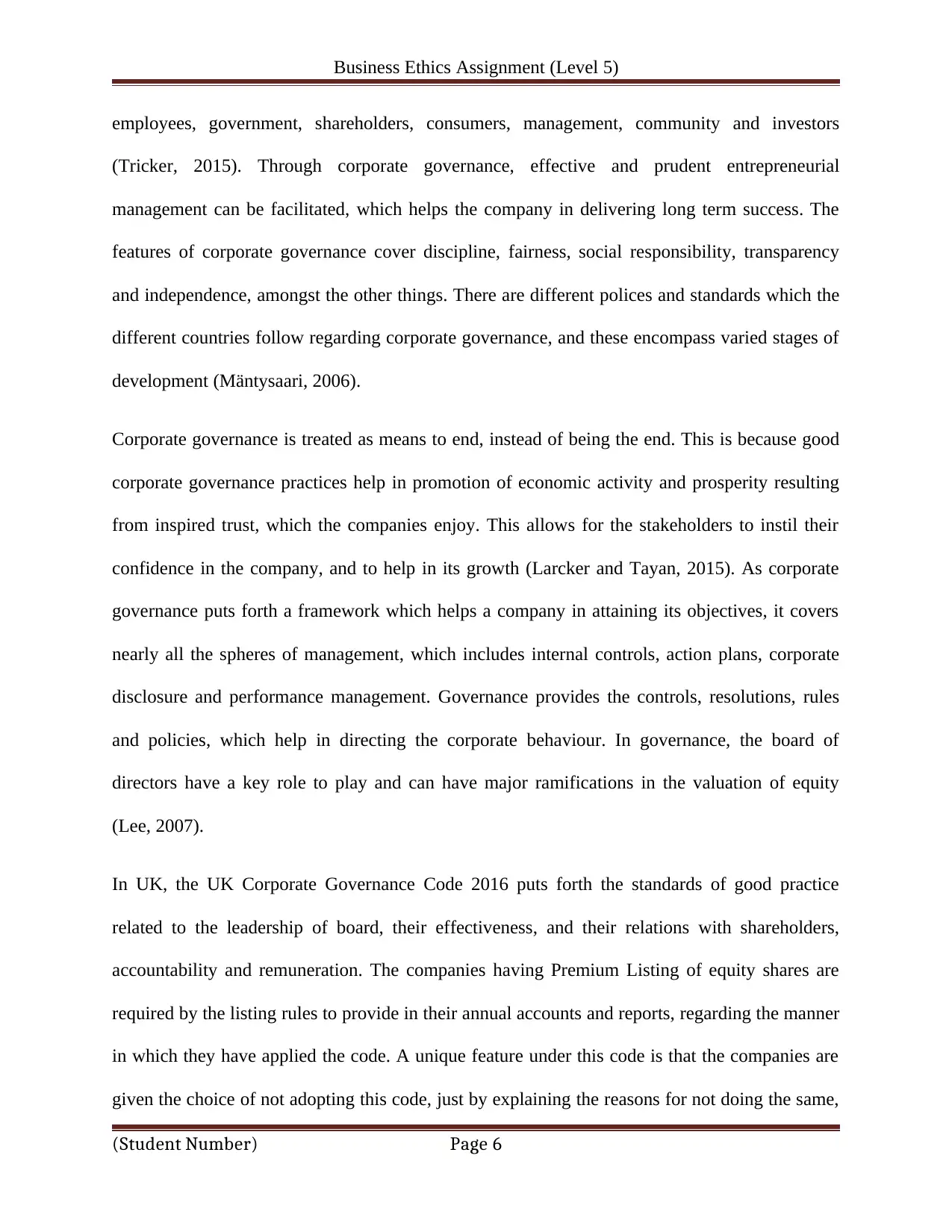
Business Ethics Assignment (Level 5)
employees, government, shareholders, consumers, management, community and investors
(Tricker, 2015). Through corporate governance, effective and prudent entrepreneurial
management can be facilitated, which helps the company in delivering long term success. The
features of corporate governance cover discipline, fairness, social responsibility, transparency
and independence, amongst the other things. There are different polices and standards which the
different countries follow regarding corporate governance, and these encompass varied stages of
development (Mäntysaari, 2006).
Corporate governance is treated as means to end, instead of being the end. This is because good
corporate governance practices help in promotion of economic activity and prosperity resulting
from inspired trust, which the companies enjoy. This allows for the stakeholders to instil their
confidence in the company, and to help in its growth (Larcker and Tayan, 2015). As corporate
governance puts forth a framework which helps a company in attaining its objectives, it covers
nearly all the spheres of management, which includes internal controls, action plans, corporate
disclosure and performance management. Governance provides the controls, resolutions, rules
and policies, which help in directing the corporate behaviour. In governance, the board of
directors have a key role to play and can have major ramifications in the valuation of equity
(Lee, 2007).
In UK, the UK Corporate Governance Code 2016 puts forth the standards of good practice
related to the leadership of board, their effectiveness, and their relations with shareholders,
accountability and remuneration. The companies having Premium Listing of equity shares are
required by the listing rules to provide in their annual accounts and reports, regarding the manner
in which they have applied the code. A unique feature under this code is that the companies are
given the choice of not adopting this code, just by explaining the reasons for not doing the same,
(Student Number) Page 6
employees, government, shareholders, consumers, management, community and investors
(Tricker, 2015). Through corporate governance, effective and prudent entrepreneurial
management can be facilitated, which helps the company in delivering long term success. The
features of corporate governance cover discipline, fairness, social responsibility, transparency
and independence, amongst the other things. There are different polices and standards which the
different countries follow regarding corporate governance, and these encompass varied stages of
development (Mäntysaari, 2006).
Corporate governance is treated as means to end, instead of being the end. This is because good
corporate governance practices help in promotion of economic activity and prosperity resulting
from inspired trust, which the companies enjoy. This allows for the stakeholders to instil their
confidence in the company, and to help in its growth (Larcker and Tayan, 2015). As corporate
governance puts forth a framework which helps a company in attaining its objectives, it covers
nearly all the spheres of management, which includes internal controls, action plans, corporate
disclosure and performance management. Governance provides the controls, resolutions, rules
and policies, which help in directing the corporate behaviour. In governance, the board of
directors have a key role to play and can have major ramifications in the valuation of equity
(Lee, 2007).
In UK, the UK Corporate Governance Code 2016 puts forth the standards of good practice
related to the leadership of board, their effectiveness, and their relations with shareholders,
accountability and remuneration. The companies having Premium Listing of equity shares are
required by the listing rules to provide in their annual accounts and reports, regarding the manner
in which they have applied the code. A unique feature under this code is that the companies are
given the choice of not adopting this code, just by explaining the reasons for not doing the same,
(Student Number) Page 6
⊘ This is a preview!⊘
Do you want full access?
Subscribe today to unlock all pages.

Trusted by 1+ million students worldwide
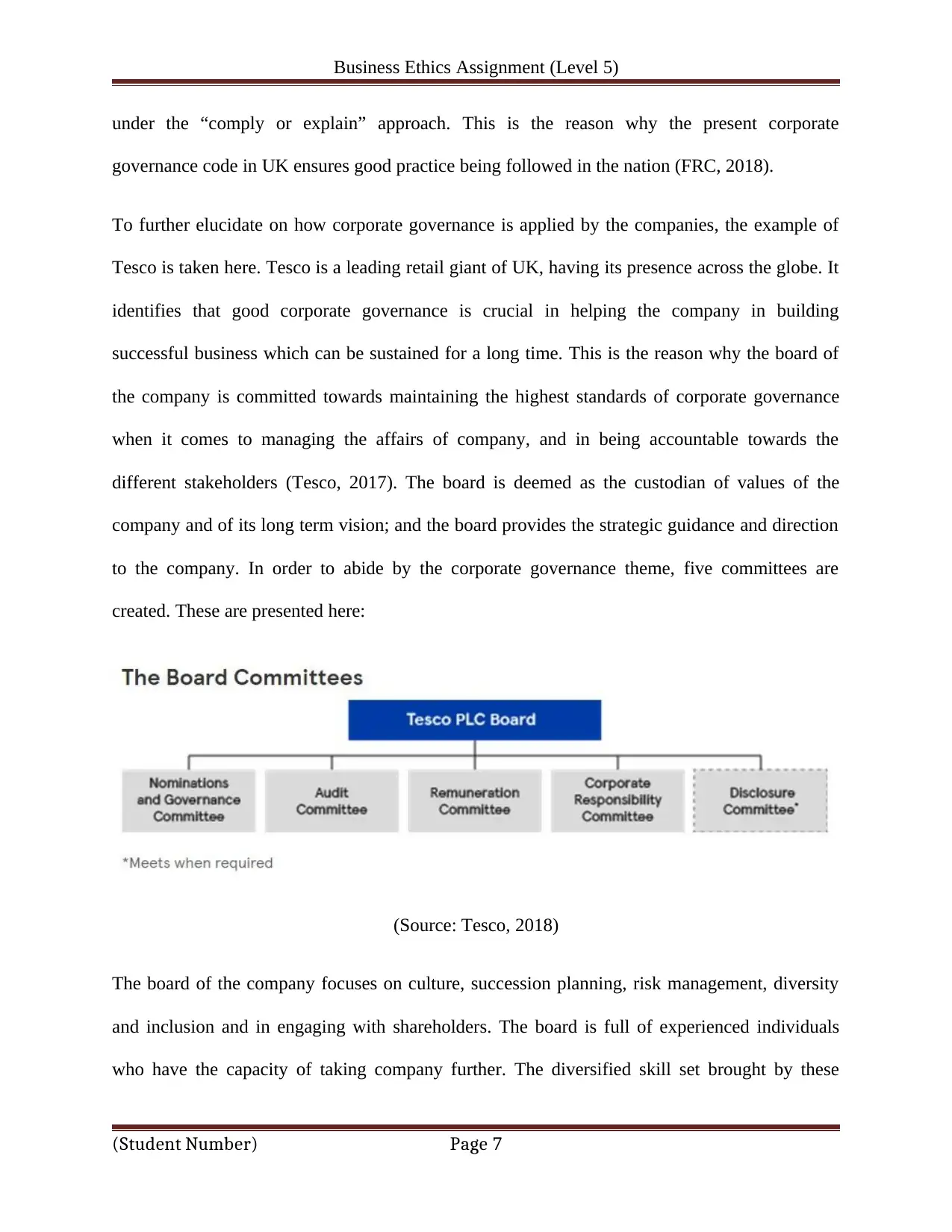
Business Ethics Assignment (Level 5)
under the “comply or explain” approach. This is the reason why the present corporate
governance code in UK ensures good practice being followed in the nation (FRC, 2018).
To further elucidate on how corporate governance is applied by the companies, the example of
Tesco is taken here. Tesco is a leading retail giant of UK, having its presence across the globe. It
identifies that good corporate governance is crucial in helping the company in building
successful business which can be sustained for a long time. This is the reason why the board of
the company is committed towards maintaining the highest standards of corporate governance
when it comes to managing the affairs of company, and in being accountable towards the
different stakeholders (Tesco, 2017). The board is deemed as the custodian of values of the
company and of its long term vision; and the board provides the strategic guidance and direction
to the company. In order to abide by the corporate governance theme, five committees are
created. These are presented here:
(Source: Tesco, 2018)
The board of the company focuses on culture, succession planning, risk management, diversity
and inclusion and in engaging with shareholders. The board is full of experienced individuals
who have the capacity of taking company further. The diversified skill set brought by these
(Student Number) Page 7
under the “comply or explain” approach. This is the reason why the present corporate
governance code in UK ensures good practice being followed in the nation (FRC, 2018).
To further elucidate on how corporate governance is applied by the companies, the example of
Tesco is taken here. Tesco is a leading retail giant of UK, having its presence across the globe. It
identifies that good corporate governance is crucial in helping the company in building
successful business which can be sustained for a long time. This is the reason why the board of
the company is committed towards maintaining the highest standards of corporate governance
when it comes to managing the affairs of company, and in being accountable towards the
different stakeholders (Tesco, 2017). The board is deemed as the custodian of values of the
company and of its long term vision; and the board provides the strategic guidance and direction
to the company. In order to abide by the corporate governance theme, five committees are
created. These are presented here:
(Source: Tesco, 2018)
The board of the company focuses on culture, succession planning, risk management, diversity
and inclusion and in engaging with shareholders. The board is full of experienced individuals
who have the capacity of taking company further. The diversified skill set brought by these
(Student Number) Page 7
Paraphrase This Document
Need a fresh take? Get an instant paraphrase of this document with our AI Paraphraser

Business Ethics Assignment (Level 5)
individuals further helps the company in being on its growth path. The committees have
individuals with proven track records in their expertise area and commit towards the team which
they lead. The board of Tesco confirms that it applies the main principles and the relevant
provisions of UK Corporate Governance Code. This is the reason why the duties of each of the
key personnel on the board are properly detailed, along with the roles of the different committees
(Tesco, 2017). The governance framework of Tesco presents clear parameters which are required
for delegation, and the responsibilities of the board.
(Student Number) Page 8
individuals further helps the company in being on its growth path. The committees have
individuals with proven track records in their expertise area and commit towards the team which
they lead. The board of Tesco confirms that it applies the main principles and the relevant
provisions of UK Corporate Governance Code. This is the reason why the duties of each of the
key personnel on the board are properly detailed, along with the roles of the different committees
(Tesco, 2017). The governance framework of Tesco presents clear parameters which are required
for delegation, and the responsibilities of the board.
(Student Number) Page 8

Business Ethics Assignment (Level 5)
(Source: Tesco, 2017)
Despite being the biggest grocer in Britain, Tesco was ranked as having the worst corporate
governance in the nation (Frean, 2016). Even with all these efforts being put in by the board of
the company towards corporate governance, it was ranked lowest in the FTSE 100 firms. The
(Student Number) Page 9
(Source: Tesco, 2017)
Despite being the biggest grocer in Britain, Tesco was ranked as having the worst corporate
governance in the nation (Frean, 2016). Even with all these efforts being put in by the board of
the company towards corporate governance, it was ranked lowest in the FTSE 100 firms. The
(Student Number) Page 9
⊘ This is a preview!⊘
Do you want full access?
Subscribe today to unlock all pages.

Trusted by 1+ million students worldwide
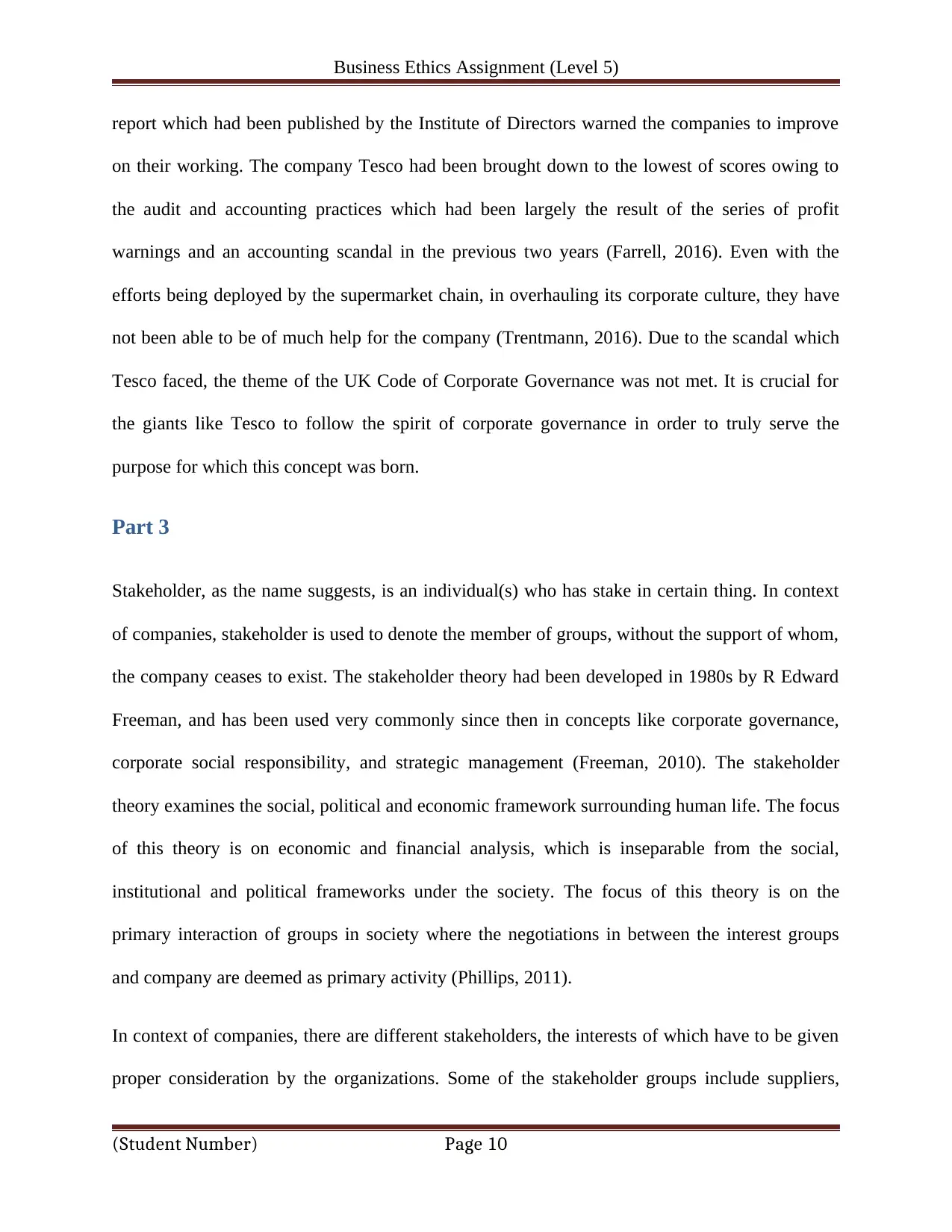
Business Ethics Assignment (Level 5)
report which had been published by the Institute of Directors warned the companies to improve
on their working. The company Tesco had been brought down to the lowest of scores owing to
the audit and accounting practices which had been largely the result of the series of profit
warnings and an accounting scandal in the previous two years (Farrell, 2016). Even with the
efforts being deployed by the supermarket chain, in overhauling its corporate culture, they have
not been able to be of much help for the company (Trentmann, 2016). Due to the scandal which
Tesco faced, the theme of the UK Code of Corporate Governance was not met. It is crucial for
the giants like Tesco to follow the spirit of corporate governance in order to truly serve the
purpose for which this concept was born.
Part 3
Stakeholder, as the name suggests, is an individual(s) who has stake in certain thing. In context
of companies, stakeholder is used to denote the member of groups, without the support of whom,
the company ceases to exist. The stakeholder theory had been developed in 1980s by R Edward
Freeman, and has been used very commonly since then in concepts like corporate governance,
corporate social responsibility, and strategic management (Freeman, 2010). The stakeholder
theory examines the social, political and economic framework surrounding human life. The focus
of this theory is on economic and financial analysis, which is inseparable from the social,
institutional and political frameworks under the society. The focus of this theory is on the
primary interaction of groups in society where the negotiations in between the interest groups
and company are deemed as primary activity (Phillips, 2011).
In context of companies, there are different stakeholders, the interests of which have to be given
proper consideration by the organizations. Some of the stakeholder groups include suppliers,
(Student Number) Page 10
report which had been published by the Institute of Directors warned the companies to improve
on their working. The company Tesco had been brought down to the lowest of scores owing to
the audit and accounting practices which had been largely the result of the series of profit
warnings and an accounting scandal in the previous two years (Farrell, 2016). Even with the
efforts being deployed by the supermarket chain, in overhauling its corporate culture, they have
not been able to be of much help for the company (Trentmann, 2016). Due to the scandal which
Tesco faced, the theme of the UK Code of Corporate Governance was not met. It is crucial for
the giants like Tesco to follow the spirit of corporate governance in order to truly serve the
purpose for which this concept was born.
Part 3
Stakeholder, as the name suggests, is an individual(s) who has stake in certain thing. In context
of companies, stakeholder is used to denote the member of groups, without the support of whom,
the company ceases to exist. The stakeholder theory had been developed in 1980s by R Edward
Freeman, and has been used very commonly since then in concepts like corporate governance,
corporate social responsibility, and strategic management (Freeman, 2010). The stakeholder
theory examines the social, political and economic framework surrounding human life. The focus
of this theory is on economic and financial analysis, which is inseparable from the social,
institutional and political frameworks under the society. The focus of this theory is on the
primary interaction of groups in society where the negotiations in between the interest groups
and company are deemed as primary activity (Phillips, 2011).
In context of companies, there are different stakeholders, the interests of which have to be given
proper consideration by the organizations. Some of the stakeholder groups include suppliers,
(Student Number) Page 10
Paraphrase This Document
Need a fresh take? Get an instant paraphrase of this document with our AI Paraphraser
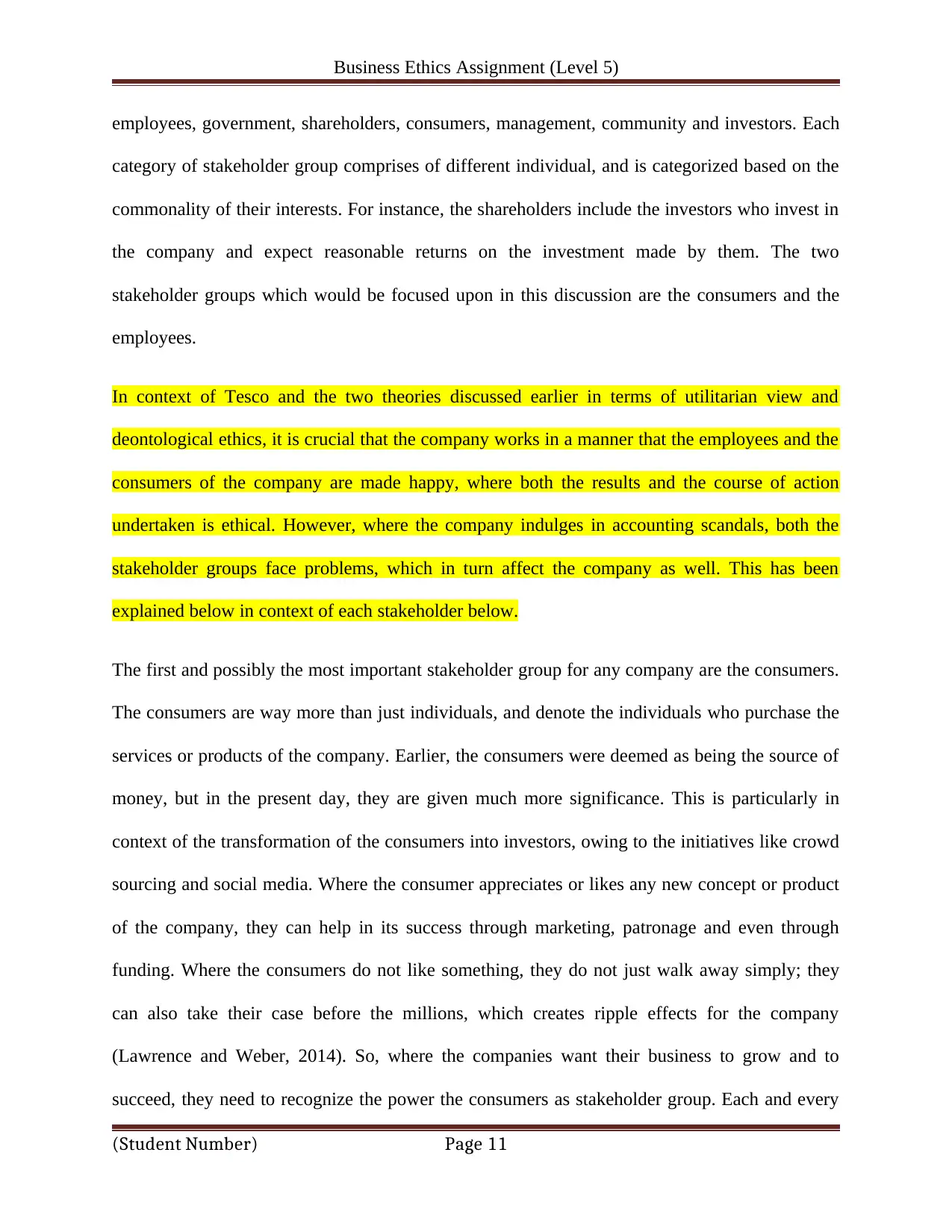
Business Ethics Assignment (Level 5)
employees, government, shareholders, consumers, management, community and investors. Each
category of stakeholder group comprises of different individual, and is categorized based on the
commonality of their interests. For instance, the shareholders include the investors who invest in
the company and expect reasonable returns on the investment made by them. The two
stakeholder groups which would be focused upon in this discussion are the consumers and the
employees.
In context of Tesco and the two theories discussed earlier in terms of utilitarian view and
deontological ethics, it is crucial that the company works in a manner that the employees and the
consumers of the company are made happy, where both the results and the course of action
undertaken is ethical. However, where the company indulges in accounting scandals, both the
stakeholder groups face problems, which in turn affect the company as well. This has been
explained below in context of each stakeholder below.
The first and possibly the most important stakeholder group for any company are the consumers.
The consumers are way more than just individuals, and denote the individuals who purchase the
services or products of the company. Earlier, the consumers were deemed as being the source of
money, but in the present day, they are given much more significance. This is particularly in
context of the transformation of the consumers into investors, owing to the initiatives like crowd
sourcing and social media. Where the consumer appreciates or likes any new concept or product
of the company, they can help in its success through marketing, patronage and even through
funding. Where the consumers do not like something, they do not just walk away simply; they
can also take their case before the millions, which creates ripple effects for the company
(Lawrence and Weber, 2014). So, where the companies want their business to grow and to
succeed, they need to recognize the power the consumers as stakeholder group. Each and every
(Student Number) Page 11
employees, government, shareholders, consumers, management, community and investors. Each
category of stakeholder group comprises of different individual, and is categorized based on the
commonality of their interests. For instance, the shareholders include the investors who invest in
the company and expect reasonable returns on the investment made by them. The two
stakeholder groups which would be focused upon in this discussion are the consumers and the
employees.
In context of Tesco and the two theories discussed earlier in terms of utilitarian view and
deontological ethics, it is crucial that the company works in a manner that the employees and the
consumers of the company are made happy, where both the results and the course of action
undertaken is ethical. However, where the company indulges in accounting scandals, both the
stakeholder groups face problems, which in turn affect the company as well. This has been
explained below in context of each stakeholder below.
The first and possibly the most important stakeholder group for any company are the consumers.
The consumers are way more than just individuals, and denote the individuals who purchase the
services or products of the company. Earlier, the consumers were deemed as being the source of
money, but in the present day, they are given much more significance. This is particularly in
context of the transformation of the consumers into investors, owing to the initiatives like crowd
sourcing and social media. Where the consumer appreciates or likes any new concept or product
of the company, they can help in its success through marketing, patronage and even through
funding. Where the consumers do not like something, they do not just walk away simply; they
can also take their case before the millions, which creates ripple effects for the company
(Lawrence and Weber, 2014). So, where the companies want their business to grow and to
succeed, they need to recognize the power the consumers as stakeholder group. Each and every
(Student Number) Page 11
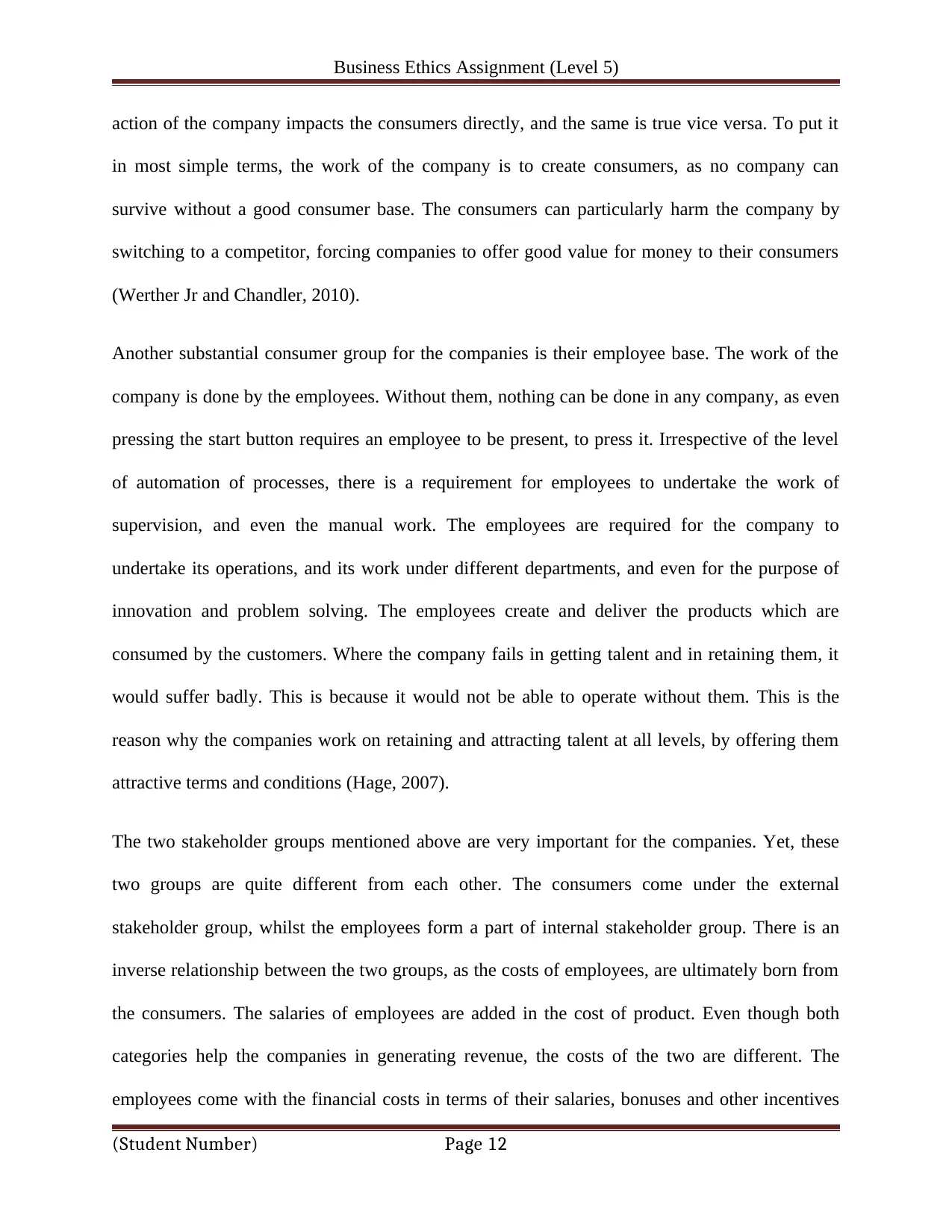
Business Ethics Assignment (Level 5)
action of the company impacts the consumers directly, and the same is true vice versa. To put it
in most simple terms, the work of the company is to create consumers, as no company can
survive without a good consumer base. The consumers can particularly harm the company by
switching to a competitor, forcing companies to offer good value for money to their consumers
(Werther Jr and Chandler, 2010).
Another substantial consumer group for the companies is their employee base. The work of the
company is done by the employees. Without them, nothing can be done in any company, as even
pressing the start button requires an employee to be present, to press it. Irrespective of the level
of automation of processes, there is a requirement for employees to undertake the work of
supervision, and even the manual work. The employees are required for the company to
undertake its operations, and its work under different departments, and even for the purpose of
innovation and problem solving. The employees create and deliver the products which are
consumed by the customers. Where the company fails in getting talent and in retaining them, it
would suffer badly. This is because it would not be able to operate without them. This is the
reason why the companies work on retaining and attracting talent at all levels, by offering them
attractive terms and conditions (Hage, 2007).
The two stakeholder groups mentioned above are very important for the companies. Yet, these
two groups are quite different from each other. The consumers come under the external
stakeholder group, whilst the employees form a part of internal stakeholder group. There is an
inverse relationship between the two groups, as the costs of employees, are ultimately born from
the consumers. The salaries of employees are added in the cost of product. Even though both
categories help the companies in generating revenue, the costs of the two are different. The
employees come with the financial costs in terms of their salaries, bonuses and other incentives
(Student Number) Page 12
action of the company impacts the consumers directly, and the same is true vice versa. To put it
in most simple terms, the work of the company is to create consumers, as no company can
survive without a good consumer base. The consumers can particularly harm the company by
switching to a competitor, forcing companies to offer good value for money to their consumers
(Werther Jr and Chandler, 2010).
Another substantial consumer group for the companies is their employee base. The work of the
company is done by the employees. Without them, nothing can be done in any company, as even
pressing the start button requires an employee to be present, to press it. Irrespective of the level
of automation of processes, there is a requirement for employees to undertake the work of
supervision, and even the manual work. The employees are required for the company to
undertake its operations, and its work under different departments, and even for the purpose of
innovation and problem solving. The employees create and deliver the products which are
consumed by the customers. Where the company fails in getting talent and in retaining them, it
would suffer badly. This is because it would not be able to operate without them. This is the
reason why the companies work on retaining and attracting talent at all levels, by offering them
attractive terms and conditions (Hage, 2007).
The two stakeholder groups mentioned above are very important for the companies. Yet, these
two groups are quite different from each other. The consumers come under the external
stakeholder group, whilst the employees form a part of internal stakeholder group. There is an
inverse relationship between the two groups, as the costs of employees, are ultimately born from
the consumers. The salaries of employees are added in the cost of product. Even though both
categories help the companies in generating revenue, the costs of the two are different. The
employees come with the financial costs in terms of their salaries, bonuses and other incentives
(Student Number) Page 12
⊘ This is a preview!⊘
Do you want full access?
Subscribe today to unlock all pages.

Trusted by 1+ million students worldwide
1 out of 16
Related Documents
Your All-in-One AI-Powered Toolkit for Academic Success.
+13062052269
info@desklib.com
Available 24*7 on WhatsApp / Email
![[object Object]](/_next/static/media/star-bottom.7253800d.svg)
Unlock your academic potential
Copyright © 2020–2026 A2Z Services. All Rights Reserved. Developed and managed by ZUCOL.





